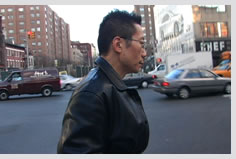
ZHANG HONGTU | ZHANG JIAN-JUN
ZHANG JIAN-JUN
Zhang Jian-Jun, unlike Hongtu who spent half of his adult life under Mao's China before he came to the U.S, was only 11 years old at the onset of the Cultural Revolution. He remained mostly unaware of the grand ideals of the time and therefore was less influenced by the ideologies. Like most kids of his age, the Cultural Revolution interrupted his education. Zhang Jian-Jun's memories were those of days without school, parents busy dodging attacks. Through a child's naiveté, Jian-Jun witnessed more clearly what was really happening underneath the ideological fog. He witnessed the cruelty from a child's eyes. The impact of the Cultural Revolution on Jian-Jun was less direct than that of Hongtu's. Jian-Jun turned more inward to seek peace and balance.
Very fortunately for that time period, he had a mentor who recognized his artistic talent and sought him out to secretly teach him the techniques of oil painting after school. Studying any kind of Western art was strictly forbidden at that time. It was considered bourgeois and reactionary. If caught, the teacher would be sent to jail. Jian-Jun learned his craft behind locked doors and closed curtains in the heat of the summer. Unlike Hongtu, Jian-Jun spent a few fruitful years during the Cultural Revolution learning his techniques at a very early age. He entered art school and later became involved in the Shanghai Art Museum. In 1987, Jian-Jun was invited on a one-year fellowship from the Asian Cultural Council to New York City. He fell in love with New York. Upon returning to China he found himself in the midst of rapid unraveling of political events. Students were demonstrating for democracy. In1989, before the Tiananmen Square incident, Jian-Jun decided that it is time for him to leave China for long term. He finally left China in July 1989, after the Tiananmen Square incident.
Jian-Jun witnessed as a child the systematic destruction of traditions during the Cultural Revolution. Now when he returns to China, he once again recognizes a similar destruction in the modern China. His experiences growing up during the Cultural Revolution led him to think often about the passing of culture and history. An important metaphor in his work is water. As with other elements, he started working with it in a direct way, using the elements of nature such as water and rocks in his work. Since he came to the U.S. in1989 and through his experiences living in New York, he has gradually shifted to conceptualizing the metaphor of water. He believes that culture and traditions, like the properties of water, is constantly flowing and is in essence one continuous body. |


